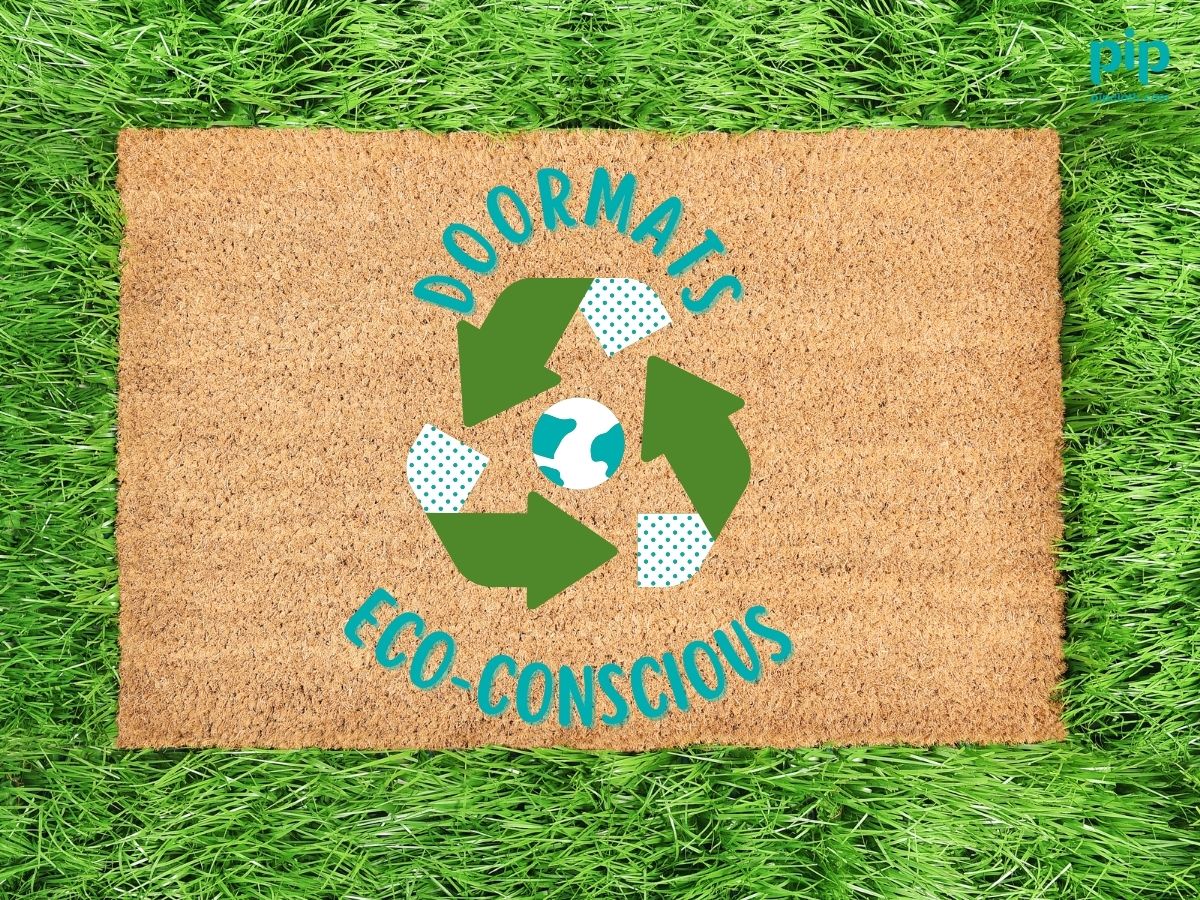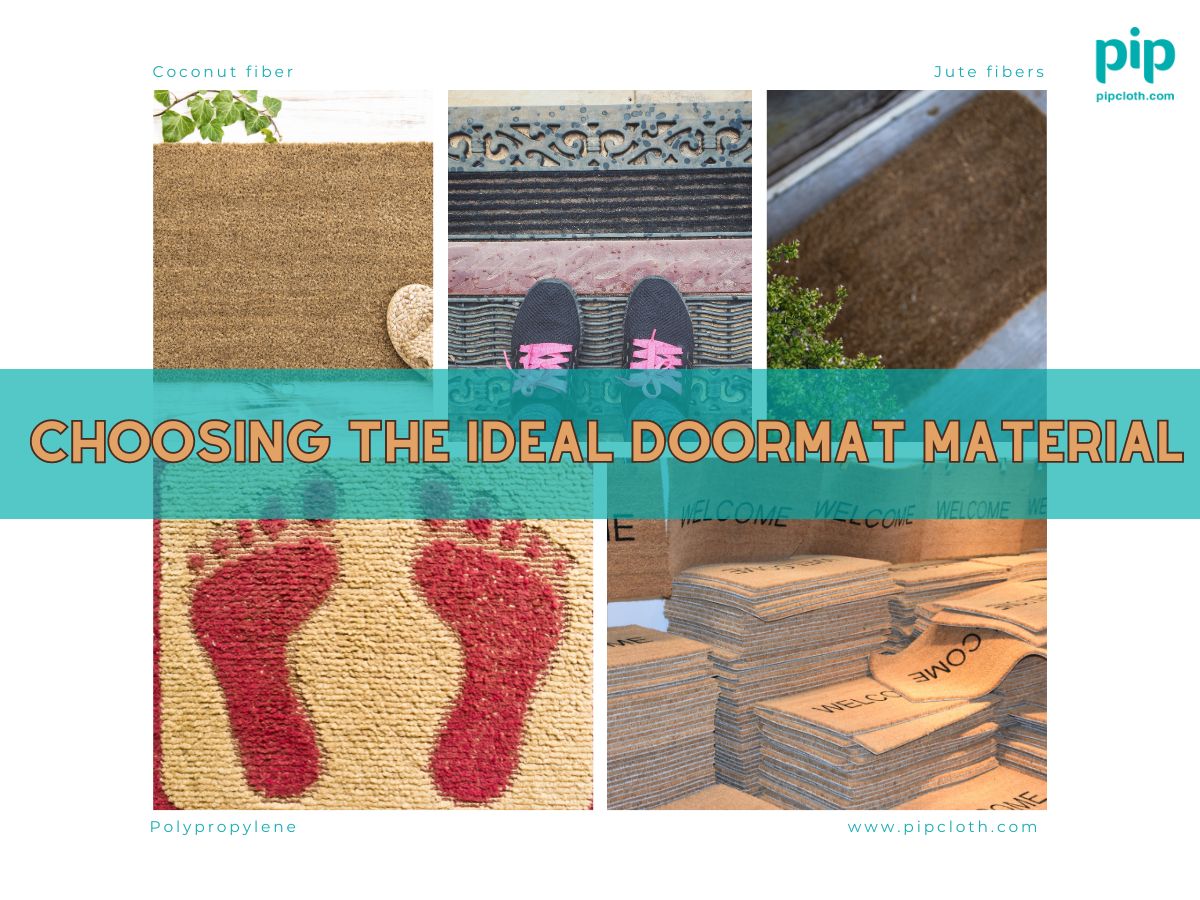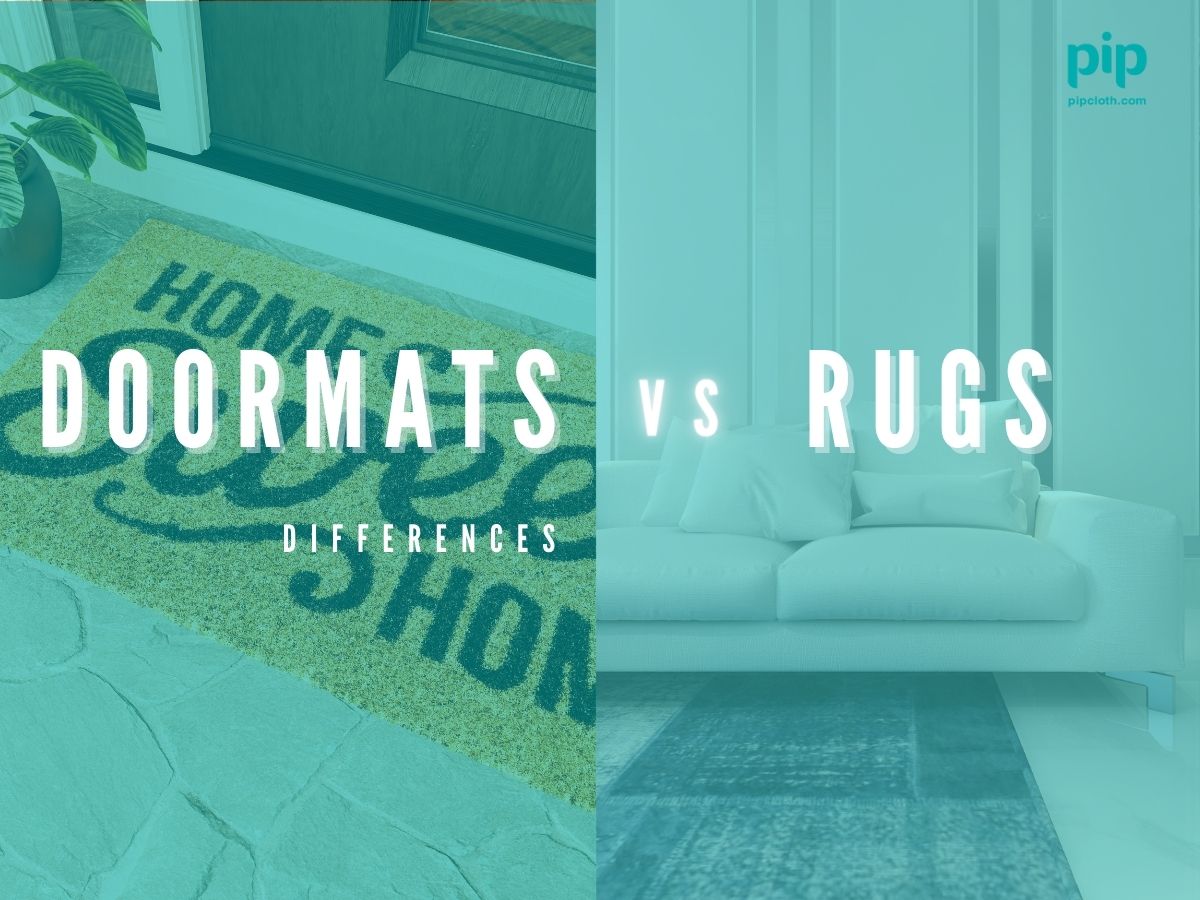In the pursuit of a greener home, every decision counts, and that includes the often-overlooked doormat. By embracing eco-conscious doormats, you can take a simple yet impactful step towards reducing your environmental footprint and contributing to a more sustainable future. This article will guide you through the benefits of choosing eco-friendly doormats, explore sustainable materials and production methods, and offer practical tips for incorporating these green greetings into your home. Armed with this knowledge, you’ll be ready to make a positive change, one doormat at a time.
The Environmental Impact of Conventional Doormats
Conventional doormats, frequently made from synthetic materials like polypropylene and PVC, can have a significant negative impact on the environment. These non-biodegradable fibers contribute to the ever-growing problem of landfill waste, with the Environmental Protection Agency (EPA) reporting that textiles, including doormats, account for a staggering 16.9 million tons of municipal solid waste generated in the United States annually. Furthermore, the production of synthetic doormats involves energy-intensive processes that release greenhouse gases and pollutants, exacerbating their carbon footprint.
In addition to the environmental concerns, conventional doormats may also pose health risks due to the use of chemical treatments and dyes. Volatile Organic Compounds (VOCs) and heavy metals found in some doormats can lead to indoor air pollution, triggering allergic reactions, respiratory issues, and chemical sensitivities in susceptible individuals. A study by the University of Melbourne found that VOC levels in homes can be up to 10 times higher than outdoor levels, highlighting the importance of choosing non-toxic, eco-friendly alternatives for a healthier living environment.
The Benefits of Choosing Eco-Friendly Doormats
Switching to eco-friendly doormats offers a multitude of benefits for both the environment and your household. These sustainable alternatives boast a lower carbon footprint throughout their lifecycle, from sourcing and production to disposal. By choosing doormats made from natural, recycled, or biodegradable materials, you actively contribute to reducing waste, conserving resources, and supporting eco-conscious manufacturing practices.
Eco-friendly doormats not only help preserve the planet but also promote a healthier indoor environment. Free from harmful chemicals and off-gassing, these doormats prioritize the use of non-toxic, natural materials that are safer for children and pets. By eliminating potential allergens and irritants, you can enhance the overall well-being and comfort of your home, creating a welcoming space that aligns with your sustainable values.
| Benefits of Eco-Friendly Doormats | Environmental Impact | Health Impact |
| Lower carbon footprint | Reduced waste | Non-toxic |
| Resource conservation | Biodegradable | Allergen-free |
| Sustainable manufacturing | Recyclable | Chemical-free |
| Waste reduction | Compostable | VOC-free |
Exploring Eco-Friendly Doormat Materials
A wide array of eco-friendly materials are available for doormats, each with its unique properties and sustainable attributes. Natural fibers like coir, jute, and seagrass are popular choices, renowned for their durability, biodegradability, and low environmental impact.
- Coir: Derived from coconut husks, coir is a robust and resilient material that can withstand heavy foot traffic while remaining biodegradable and compostable at the end of its life. Coir doormats have a lifespan of up to 6-10 years, making them a long-lasting and sustainable choice.
- Jute: Known for its softness and absorbency, jute is a rapidly renewable resource that requires minimal water and pesticides during cultivation. Jute plants can grow up to 10 feet in just 4-6 months4, making them an eco-friendly and regenerative option for doormat production.
- Seagrass: With its natural water-repellent properties, seagrass offers a sustainable option for moisture-prone areas. Seagrass grows abundantly in coastal regions and can be harvested without damaging the plant or surrounding ecosystem, promoting biodiversity and carbon sequestration.
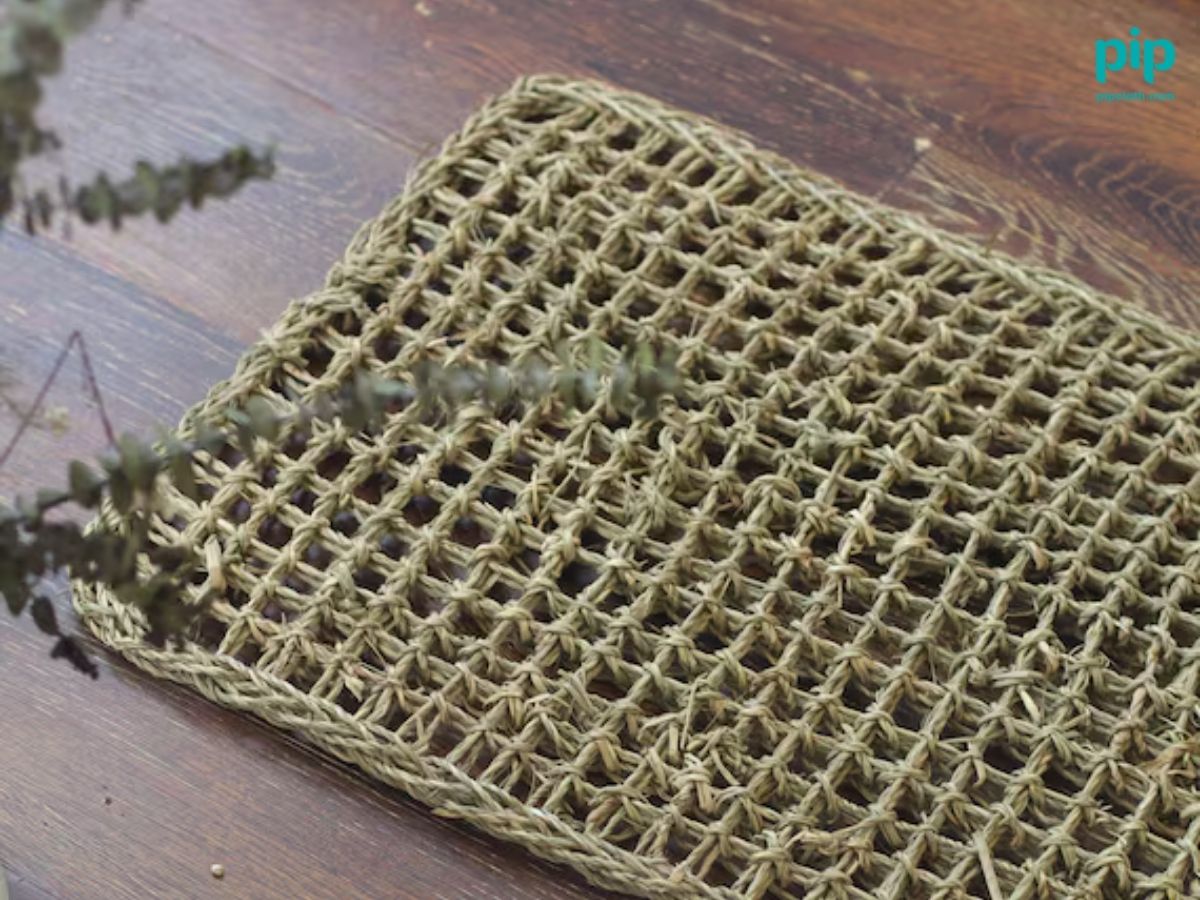
In addition to plant-based fibers, recycled and upcycled materials are gaining traction in the eco-friendly doormat market. Recycled plastic and rubber doormats divert waste from landfills, giving new life to discarded items like plastic bottles and tires. These materials offer durability and weather-resistance, making them suitable for outdoor use. Upcycled textile doormats, crafted from pre-consumer fabric waste, showcase unique designs while reducing the demand for virgin resources.
For those seeking the ultimate in biodegradability, options like natural rubber and plant-based materials are worth considering. Natural rubber, derived from rubber trees, is a renewable and eco-friendly alternative to synthetic rubber. Doormats made from coconut coir, sisal, or hemp showcase the versatility of agricultural waste and byproducts, transforming them into functional and sustainable home accessories.
Sustainable Production Methods for Eco-Friendly Doormats
The sustainability of a doormat extends beyond its material composition, encompassing the production methods employed in its creation. Handwoven and handcrafted doormats, often made by skilled artisans using traditional techniques, offer a low-impact alternative to mass-produced options. These doormats not only support local communities and preserve cultural heritage but also minimize energy consumption and emissions associated with industrial manufacturing.

Eco-conscious brands are increasingly adopting sustainable production practices to reduce their environmental impact. Water conservation and recycling initiatives, such as efficient irrigation systems and wastewater treatment, help minimize water usage in the manufacturing process. The use of renewable energy sources, like solar, wind, and hydropower, reduces reliance on fossil fuels and lowers the carbon footprint of doormat production.
Lean manufacturing principles, which focus on minimizing waste and optimizing resource efficiency, are another hallmark of sustainable doormat production. By implementing strategies like recycling and repurposing production waste, manufacturers can further reduce their environmental impact and contribute to a circular economy.
Factors to Consider When Choosing an Eco-Friendly Doormat
When selecting an eco-friendly doormat, several key factors should be considered to ensure the best fit for your home and lifestyle. Durability and longevity are crucial, especially for high-traffic areas and outdoor use. Look for doormats with sturdy construction, reinforced edges, and weather-resistant materials to withstand the test of time and the elements. Investing in quality craftsmanship not only ensures a longer lifespan but also reduces the need for frequent replacements, minimizing waste.
Maintenance and cleaning requirements are another important consideration. Opt for doormats that are easy to care for, with simple shake-out or vacuum routines for regular upkeep. Spot-cleaning and hosing down should be straightforward, without the need for harsh chemicals or special treatments. Some eco-friendly doormats are even machine washable, allowing for convenient deep cleaning when necessary.
Safety and slip-resistance are paramount, especially in wet or slippery conditions. Look for doormats with textured surfaces, raised patterns, or natural fiber grips to provide traction and stability underfoot. Non-skid backing materials, such as natural rubber or recycled TPE, can further enhance safety by keeping the doormat securely in place.
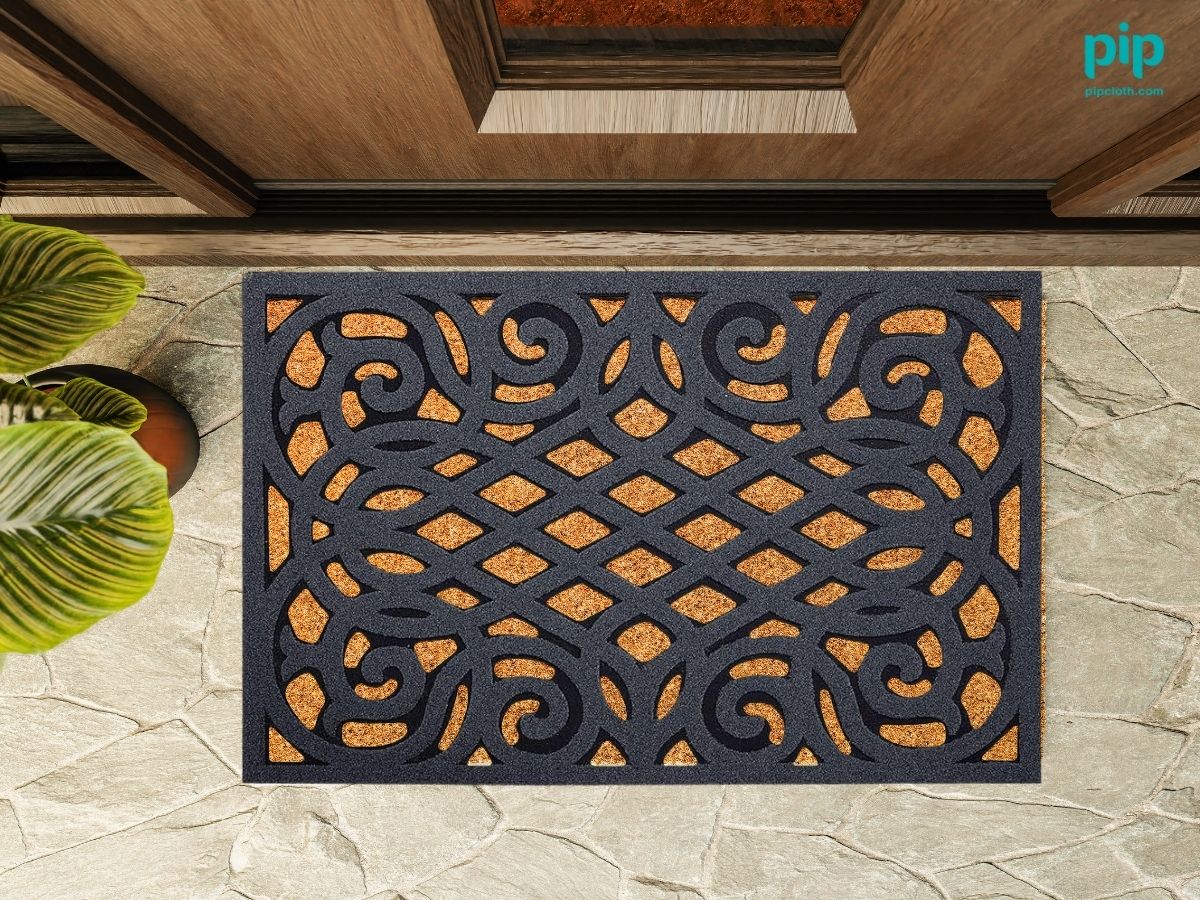
Absorbency and moisture control are key factors, particularly for entryways exposed to rain, snow, or heavy foot traffic. Quick-drying fibers like coir and jute are excellent choices for their ability to absorb moisture and release it quickly. Microfiber and polyester blends offer effective moisture-wicking properties, while bamboo and hemp naturally resist mold and mildew growth.
How can I prevent my doormat from slipping or moving around?
Incorporating Eco-Friendly Doormats into Your Sustainable Lifestyle
Eco-friendly doormats are just one piece of the sustainability puzzle, but they can seamlessly integrate into a holistic, environmentally conscious lifestyle. Complement your sustainable doormat with other eco-friendly home decor choices, such as bamboo or cork flooring, energy-efficient lighting, and organic textiles. Create a cohesive and inviting entryway by pairing your doormat with recycled plastic or natural fiber outdoor rugs, adding sustainable planters with native greenery, and incorporating reclaimed wood or bamboo furniture.
Promoting eco-friendly habits and practices goes hand in hand with sustainable doormats. Encourage shoe removal and cleaning at the entrance to reduce the spread of pollutants and extend the life of your flooring. Implement a “leave no trace” mindset by properly disposing of dirt and debris, and minimize single-use plastics and packaging in your entryway organization.
Supporting Sustainable Brands and Initiatives
As a conscious consumer, supporting sustainable brands and initiatives is a powerful way to drive positive change. Research and prioritize companies with transparent and ethical supply chains, fair labor practices, and a genuine commitment to environmental stewardship. Look for third-party certifications like the Global Organic Textile Standard (GOTS), Forest Stewardship Council (FSC), and Fair Trade Certified to ensure the doormat aligns with rigorous social and ecological standards.
Engaging with sustainable initiatives and campaigns is another avenue for making a difference. Participate in eco-friendly challenges like Plastic-Free July or Zero Waste Week to reduce your environmental impact and inspire others. Support conservation and climate change mitigation efforts by donating to reputable environmental organizations or volunteering for local sustainability projects.

Can I make a doormat using old or waste clothing materials?
Conclusion
Embracing eco-conscious doormats is a simple yet significant step towards creating a more sustainable home. By choosing doormats made from natural, recycled, or biodegradable materials and supporting ethical production methods, you actively reduce your environmental footprint and contribute to a greener future. Eco-friendly doormats not only benefit the planet but also promote a healthier living space for you and your loved ones.
As you embark on your sustainable living journey, remember that small changes can have a big impact. Start with mindful choices like eco-friendly doormats and gradually incorporate sustainability into other areas of your life. By setting an example and sharing your experiences, you can inspire others to join the movement and create a ripple effect of positive change.
Together, we have the power to build a more sustainable and resilient world, one doormat at a time. Embrace the opportunity to make a difference, and let your eco-friendly doormat be a daily reminder of your commitment to a greener tomorrow.
FAQ Section:
Q1: How can I tell if a doormat is truly eco-friendly?
Look for third-party certifications like the Global Organic Textile Standard (GOTS), Forest Stewardship Council (FSC), or Fair Trade Certified. These certifications ensure that the doormat meets rigorous environmental and social standards throughout its production process. Additionally, check the material composition and look for natural, recycled, or biodegradable fibers.
Q2: Are eco-friendly doormats more expensive than conventional options?
While eco-friendly doormats may have a higher upfront cost, they often prove to be a better long-term investment. These doormats are typically made from high-quality, durable materials that can withstand heavy use and last longer than cheaper, synthetic alternatives. Over time, the cost per use of an eco-friendly doormat can be lower than repeatedly replacing less durable options.
Q3: How often should I replace my eco-friendly doormat?
The lifespan of an eco-friendly doormat depends on factors such as material, construction quality, and level of foot traffic. On average, a well-made coir doormat can last between 5-10 years, while a durable recycled rubber mat may last 3-5 years. Regular cleaning and maintenance can help extend the life of your doormat and reduce the need for frequent replacements.
Q4: Can I recycle my old doormat when replacing it with an eco-friendly option?
The recyclability of your old doormat depends on its material composition. Doormats made from natural fibers like coir or jute can often be composted, while those made from recycled materials like rubber or plastic may be recyclable through specialized programs. Check with your local recycling center or the manufacturer for specific guidance on disposing of your old doormat responsibly.
Q5: Are eco-friendly doormats as effective at trapping dirt and moisture as conventional mats?
Yes, eco-friendly doormats can be just as effective, if not more so, at trapping dirt and moisture compared to conventional options. Natural fibers like coir and seagrass are highly absorbent and have a coarse texture that effectively scrapes dirt and debris from shoes. Recycled rubber mats also provide excellent traction and can withstand exposure to the elements.
Q6: How can I style my eco-friendly doormat to complement my home’s decor?
Eco-friendly doormats come in a wide range of styles, colors, and patterns to suit various design preferences. Look for mats with natural, earthy tones for a rustic or bohemian look, or opt for bold, geometric designs for a modern aesthetic. Consider layering your doormat with a larger, eco-friendly outdoor rug for added visual interest and functionality.
Q7: Can I use an eco-friendly doormat indoors as well as outdoors?
Yes, many eco-friendly doormats are suitable for both indoor and outdoor use. Natural fiber mats like coir or jute can add a warm, organic touch to entryways or mudrooms, while recycled fabric or upcycled textile mats can provide a pop of color and texture to interior spaces. Just be sure to choose a mat with a non-slip backing for indoor use to prevent accidents.
Q8: How can I clean and maintain my eco-friendly doormat?
Regular cleaning and maintenance are key to extending the life of your eco-friendly doormat. For natural fiber mats, shake out loose dirt and debris daily, and vacuum or sweep weekly. Spot clean stains with a mild detergent and water, and allow the mat to air dry completely before use. For recycled rubber or plastic mats, hose down with water and scrub with a soft-bristled brush as needed.
Q9: Can I find eco-friendly doormats in custom sizes or shapes?
Yes, some eco-friendly doormat brands offer custom sizing and shaping options to fit your specific entryway needs. Look for companies that specialize in made-to-order or bespoke mats, and inquire about their eco-friendly material options. Keep in mind that custom orders may have a longer lead time and higher price point compared to standard sizes.
Q10: How can I encourage others to choose eco-friendly doormats?
Lead by example and share your positive experiences with eco-friendly doormats through social media, product reviews, or personal recommendations. Educate others about the environmental and health benefits of choosing sustainable materials and supporting ethical production practices. Consider gifting eco-friendly doormats to friends and family, or advocating for their use in community spaces like schools, offices, or local businesses.
Q11: Can I expedite the shipping of my doormat order?
PipCloth offers a Fast Express worldwide shipping option that delivers your doormat within 7 to 12 days of placing your order. This expedited service costs $12.95. And with Standard Express – Worldwide Shipping (Delivery within 15 to 18 days of order): $4.95

